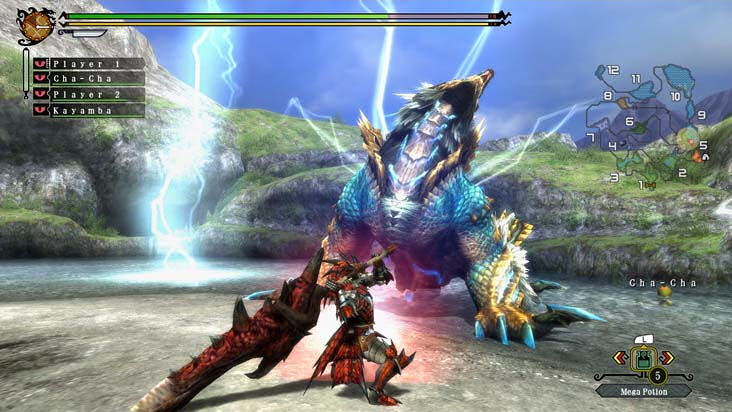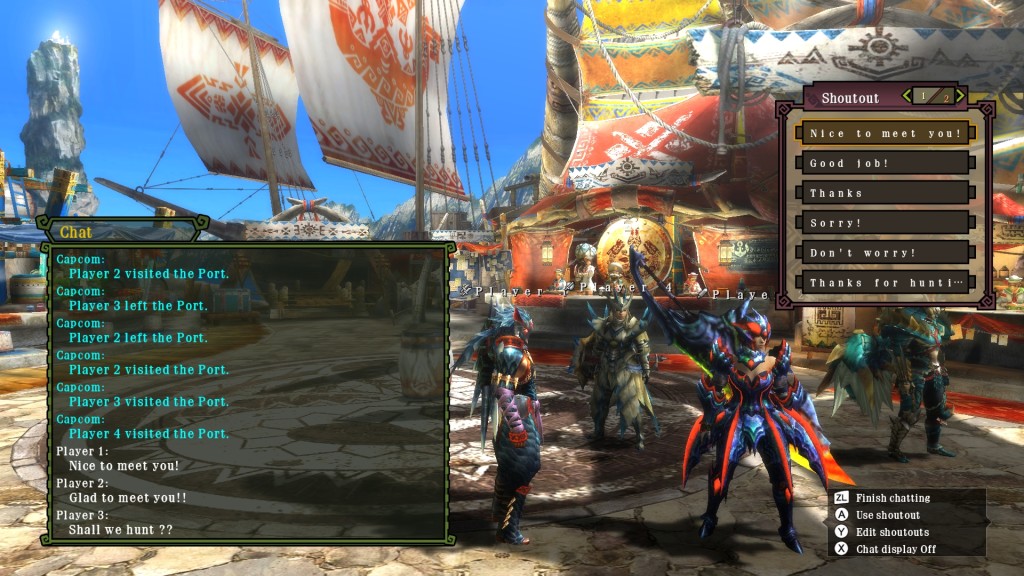The soul of the sluggard craves and gets nothing,
But the soul of the diligent is made fat.Proverbs 13:4
Since Monster Hunter isn’t a game you “complete” any time in a reasonable number of hours, I figure I may as well post my thoughts in case I never finish the single player campaign or the multiplayer hunts. You know how gamers are – we sometimes find ourselves easily distracted with the shiniest new piece of jewelry, only to abandon it in favor of the ever-present New and Hype.
Monster Hunter 3 Ultimate (the latest iteration) looks from afar like either the most boring MMORPG ever created (seriously, interconnected areas seperated via loading screen? What is this, the 1990s?) or a lackluster single-player RPG that emphasizes grinding above all else. In both respect, that judgment isn’t necessarily wrong; Monster Hunter never did show the pinnacle of graphical prowess on any system, nor does its entirely linear nature do it any favors for most people.
And yet, there’s something undeniably compelling about Monster Hunter as a game. Most MMOs rely on a strict targeting system; Monster Hunter, on the other hand, plays like an action game with preparation elements. If you’re thinking the original Rainbow Six and the earlier Tom Clancy games, then the apple does not fall far from that tree. Nothing more and nothing less, Monster Hunter recreates the appeal of hunting wildlife and game: to outwit and outsmart the animals you hunt. Of course, since we’re talking about a video game, we can make the monsters much more intimidating and infinitely smarter, but you get the idea.
The main game consists of taking on Hunting Guild quests; most of them consist of innocuous tasks like gathering resources through plucking herbs, fishing, and mining. More friendly wildlife provide you with other resources when you kill them such as meats and animal skins. All these items play into an extended crafting and item combination system where you can make useful items for armor, weapons, and new items. For most people, we can safely consider these “busywork”. At the same time, they provide context for the actual, real monster hunts by duplicating the spirit, if not the form, of making sure you hold everything you need before confronting a massive beast. That quiet time in-between hunts makes the main attraction much more interesting!
And hunting itself also appears quite basic. Choose a weapon, each with their own strengths and weaknesses, and smack the thing to death. Most every weapon contains combos and attack strings, but they all retain some heavy recovery time – pick your shots, or you might find yourself in a sticky situation. Items from your gathering sessions turn into life-saving objects. You’ll need paintballs to track monsters when they attempt to flee, for example, and traps to capture some of the monster alive (which provides a greater variety of materials, or so I hear). In many ways, the combat reminds me of the Souls series: wait, predict, react. All the monsters themselves contain a ton of variety in both appearance and attack patterns, meaning it might take multiple attempts for you to beat it.
And like Souls, the victory satisfies in a way that few other games can boast. Monster Hunter ramps up the difficulty slowly, encouraging you to exploit all the game’s various systems to your advantage. Use meal tickets for extra stamina and stat bonuses. Operate the farm for additional ways to make potions and other useful health regenerating items. Resources (a currency you use in town to build up various parts of it) will give you additional functions which eventually become necessary to completing challenges. Hunt certain monsters multiple time to craft more and more powerful weapons and armor. Again, all the side systems here play into the main focus, which really means nothing ever goes to waste.
Unlike similar MMORPGs (say, World of WarCraft), you continually craft new items, and nothing ever becomes outdated due to a random number generator or a lucky drop – you earn each and every piece of gear down to the money and the materials that put it together. Yes, you will need to grind, but you’ll never out-level anything; even the simplest hunt can go wrong if you become too cocky or aren’t paying attention. That means progression solely depends on your ability and your time spent planning and developing yourself, not an arbitrary system of experience points or abilities. The more familiar you become with your moveset and options, the more likely you will succeed.
That, I imagine, seems part of the point. Spend time with this game (and trust me, most of the game takes its time meting out both tutorials, abilities, and materials), and you will grow in your knowledge and skill. The progression’s more subtle than in most games, primarily because you, the player, upgrade as you go. By earning that status as a skilled Monster Hunter, you must actually play the game well. As a Role-Playing Game, then, Monster Hunter succeeds purely on that basis should you choose to hunt monsters at all. Imagine adding friends and multiple people into this environment, and the answer’s obvious: Monster Hunter’s a lot of fun and a huge success.
That is, if you’re willing to buy into the concept. Most would consider the control scheme “clunky”, and while there’s some truth to that, I think a better fit is “constrained”. There’s no lock-on function of any combat use, even in the third game of the series. The camera won’t stick behind your back, so an analog stick (for 3DS users, a button) needs constant care and attention to keep the monster in sight. Honestly, that isn’t as big of a problem as you would imagine; a locked camera would make looking around for the monster fairly difficult, and a lock-on function would mean careful attacking would be rendered moot, especially with ranged weapons.
On the other hand, the item management frustrates me to no end. The system makes no sense, requiring you to hold a button while scrolling left and right through your inventory with, you guessed it, two other face buttons. On both consoles, the third game alleviates this through touchscreen controls, but they still present an extremely bothersome system for a system so essential to success in Monster Hunter. It’s not like you need additional problems when sheathing your weapon to get a paintball, and the interface punishes you for inaccuracy for something that should just work.
Other than that, though, Monster Hunter remains compelling and entertaining. Still, to understand it will require some dedication to the cause of beating its many challenges, to working hard in understanding it. Again, Souls series comparison remain more than apt; while Souls strives for distance, alienation, and inaccessibility, Monster Hunter encourages players to prepare in excessive amounts for each encounter by applying everything they learn throughout the game. In both cases, though, the intangible rewards of victory and the rewards for your dedication place an apt capstone on the game experience.
In other words, it’s worth trying and experiencing. Who knows? You might find yourself more up to the challenge than you initially suspected. Spend a little time and effort for such games, for the end result often surpasses any expectations an initial glance would provide.
Obviously, I need to play more to confirm this, but that seems a probable summation of Monster Hunter’s appeal.


